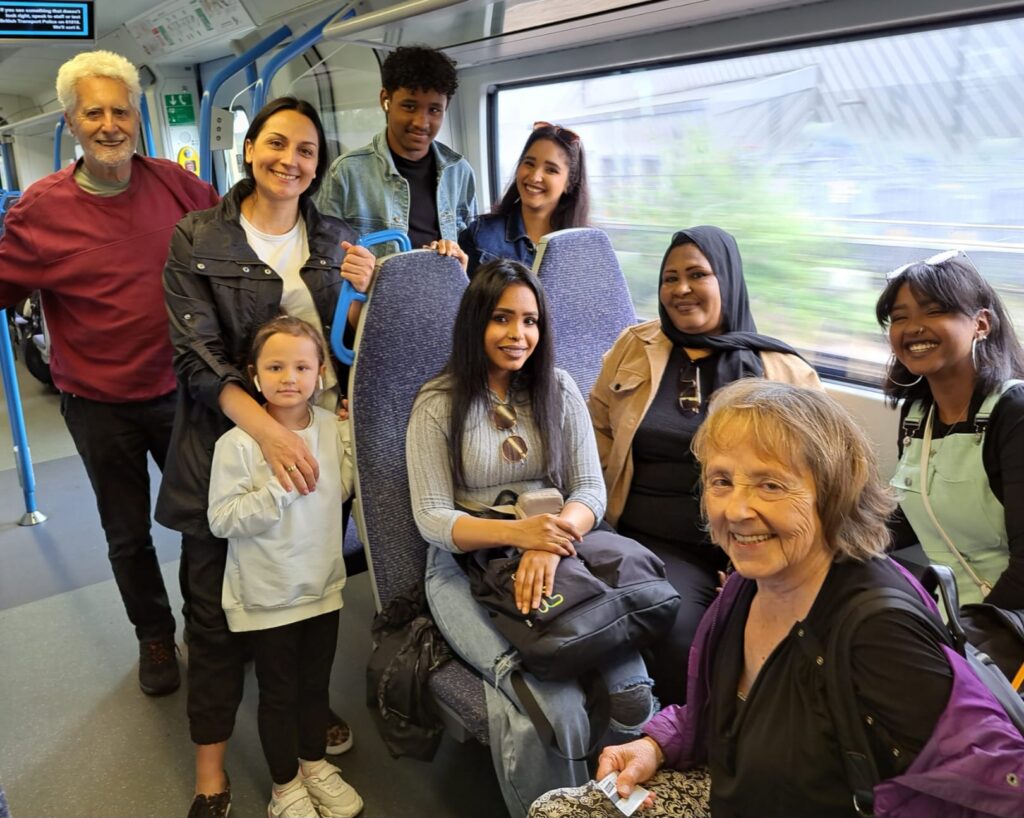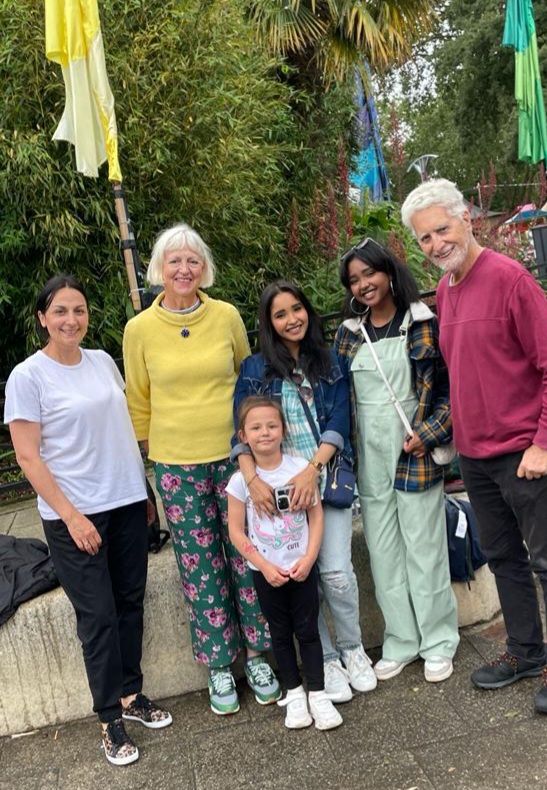Read an inspirational story about a Community Sponsorship group’s journey of welcome.
Born out of a work shed in the winter of 2020, a group shares their journey of welcoming a family, with the hope to inspire and guide future Community Sponsorship groups. The group reflects on their first year of support as they mark the one year anniversary of the family’s arrival.
The Application Process
“It just felt like something that would be real in the increasingly strange, abstracted, times of lockdown; that it would make a tangible and potentially profound difference to the life-prospects of whoever the refugees were and possibly (selfishly?!) that it might also be a positive thing for me”
The group started out with Tom, an Events Organiser and father of two, who came across a Guardian article about Community Sponsorship during lockdown. His idea quickly flourished as he got the word out in the community, interest grew, and his group became a team of ten. After familiarizing themselves with the Community Sponsorship application process, they got to work promoting their project and raising the funds needed to support a refugee family. From setting up stalls at local markets and outdoor events, organising sponsored walks, hosting a jazz concert, to putting on a village ceilidh, the group went all in with their fundraising efforts and managed to raise the funds needed to partner with a Lead Sponsor and exceed their fundraising goals for their application.
After strategically designating roles to each volunteer, the group began researching their local area, including doctor’s surgeries, schools, access to ESOL, interpreting services, local job centres, employment and volunteering opportunities, to evidence that they could fulfil the requirements of supporting a family through the scheme. They created their safeguarding and complaints policies, drafted a budget, and finalised their application.
After receiving Approval in Principle, they started the hunt for suitable accommodation, which, admittedly, was not an easy feat. After a seemingly endless search, the group managed to connect with a local landlord, highlighting the importance of establishing a presence in the community from the start, and managed to secure a three-bedroom home. After submitting their Property Offer Form, they gained full approval and began anxiously waiting for the Home Office to match them with a family.
The Family’s Arrival
Once the group were matched to an appropriate family they felt they could support, four of the volunteers met the family for the first time at the airport. They travelled with the family in a minibus back to their new home where other group members awaited with a culturally appropriate, hot meal and a full house of groceries. The family were delighted with their new home and were shown around with the interpreter. The group left the family soon after to settle in and get some much needed rest.
In the first few weeks, it was evident the family were still exhausted and needed to get their bearings, so the group ensured to give them ample time to settle in and adjust before tackling the necessary admin tasks to get the family set up for their new life in the UK. This included applying for benefits, registering with a GP, registering for school, and applying for bank accounts.
They inevitably faced challenges during this period. A few of these challenges include school registration taking longer than expected, the transport and time commitment for weekly/fortnightly visits to the job centre, the family’s Child Benefit application was very delayed, and local ESOL classes were full. Prior to settling in the UK, when the family members had worked, they had only ever been paid cash in hand, and always at the end of the workday. They had to learn to budget based on a monthly payment which proved difficult at first and the family sometimes found themselves with no money left in the week before their Universal Credit was due. In addition to these challenges, disasters taking place in their home country preoccupied the family, making it understandingly difficult to focus on establishing themselves in the UK.
The group implemented six-week review meetings with the family and the interpreter to monitor how they were adjusting and integrating. Once enrolled in ESOL classes at the local college, the family’s confidence and independence grew. They bought their own train tickets, knew alternate routes in case of train strikes, and travelled independently to their classes. They even discovered and applied for a bursary that refunded train tickets and subsidised their food in the canteen. They were enthusiastic and very motivated to learn English. The younger family members managed to secure jobs which aided their integration.

Some Lessons Learned
The group learned several lessons during this time that they hope future groups can learn from:
- It is important that Job Coaches access interpreters so that they can communicate directly with a family member rather than speaking through volunteers, who do not speak the family’s language.
- Child Benefit can take a long time to be processed. If it is taking too long, then contact Reset who can escalate the matter with the Home Office Community Sponsorship team. It is also important to make it clear on the Child Benefit application that this is a newly resettled family who have arrived in the UK and include their case reference number on their application form.
- Approaching employers personally, especially if a volunteer had some contact or a way in, was more effective than just using job sites.
- There is a service provided by the local Council called the Ethnic Minorities and Travellers Achievement Service (EMTAS), which provides workers to advise schools about the needs of children who do not speak English or are from a disadvantaged background.
- Not having a local community or shops from their own culture is hard for the family. Introducing them to a shop and community a 15-minute train ride away worked well, except that it is expensive for all the family to travel there.
- In Muslim culture the weekend starts on Friday when people go to Mosque, into Saturday. It can be hard for men in the family to be working or attend college on Friday. It is important to ask the college and workplace to provide somewhere to pray on a Friday.
- The use of professional interpreters is expensive. For everyday interaction, the Google Translate app works well. Having two Arabic speaking volunteers proved to be lifesaving in emergencies and for helping with complex bureaucratic tasks which are hard to negotiate using Google Translate.

Moving Towards Independence
As time progressed and the family’s confidence grew, the group knew it was time to start stepping back and letting the family take control. Due to the nature of Community Sponsorship, the family had inevitably become dependent on the group as the volunteers had been solving the issues that arose and meeting their needs. When this started to change as the group began to withdraw their support, there was a sense of abandonment felt on both sides. However, the group knew this is what it takes for the family to truly establish themselves and become fully independent in the UK.
The group and the family are still on their journey, but the volunteers have taken more of a back seat as the family becomes more independent and takes control of their own lives. The group has accepted that they “will now be led by [the family] about what help and support they need on their road to full independence.”
